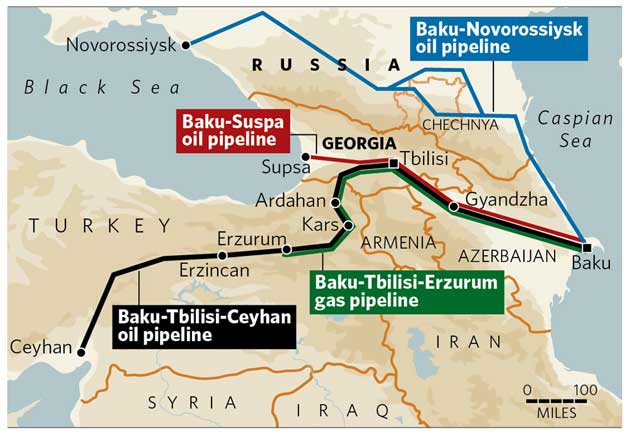Battle for Oil: EU’s hope to bypass Russian energy may be a pipe dream

Georgia may have no natural resources to speak of, yet it has become a key player for Europe, due to 155 miles of pipeline that snake across its territory.
The Baku-Tbilisi-Ceyhan pipeline is the only practical route for carrying Caspian oil to Western markets that avoids Russia – a treasured asset for the a European Union trying to reduce energy dependence on Moscow.
The BTC, which connects Baku in Azerbaijan, via the Georgian capital Tbilisi with Ceyhan, a port on the south-eastern Mediterranean coast of Turkey, was once billed as the "pipeline of peace". Now it finds itself on the fringes of war zone as Russian and Georgia face off.
"The whole conflict is not being waged over the pipeline. The reasons are definitely geopolitical," explained Natalia Leshchenko, a Russia analyst at Global Insight. "However, the Russians know the pipeline is important to Georgia and may try to damage it. They have the capability to do so."
As fighting raged over the weekend, Georgian officials said Russian fighter jets had targeted the pipeline, but missed. "This shows that Russia has not just targeted Georgian economic outlets but international economic outlets," said Economic Development Minister Ekaterina Sharashidze, tying her nation's fate firmly to that of the West. There was no independent confirmation of the raids although BP, with a 30 per cent stake in the project, were unaware of explosions.
The security of the pipeline was already in the spotlight after an attack on a Turkish section by Kurdish separatists last week, and the Russian/Georgian conflict will not ease those concerns. The pipeline runs 35 miles from the South Ossetian border.
The European Union is keen to wean itself off Russia, which supplies a quarter of its oil and half its natural gas, and is targeting central Asia, one of the world's few untapped oil provinces.
The BTC pipeline, which cost $4bn to build, is the heart of that effort. It was bitterly opposed by Moscow, which feared an easing of its energy stranglehold and a dilution of influence in the region.
The pipeline, which featured in the James Bond film The World is Not Enough, can pump around a million barrels a day. Lesser amounts of crude flow through Baku-Supsa line. Gas also transits Georgia through the Baku-Tbilisi-Erzurum pipeline, which provides over 6.5 billion cubic meters a year. But it is not so much quantity as comfort.
"For Europeans, an alternative supply route is psychological reassurance. It's having a route that does not go through Russia," said Ms Leshchenko. "But the other countries the pipeline passes through may ultimately prove more unreliable."
There are plans afoot for another gas EU route, the Nabucco pipeline, which is meant to transport non-Russian gas and pass through territory independent of Moscow. Until recently Georgia was the ideal candidate.
"But if Georgia is no longer a safe passageway, then all of these schemes for diminished dependency on Russia go up in smoke," says Michael Klare, author of Rising Powers, Shrinking Planet: The New Geopolitics of Energy.
Join our commenting forum
Join thought-provoking conversations, follow other Independent readers and see their replies
Comments
Bookmark popover
Removed from bookmarks